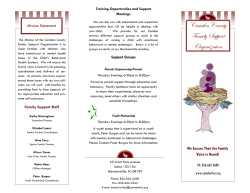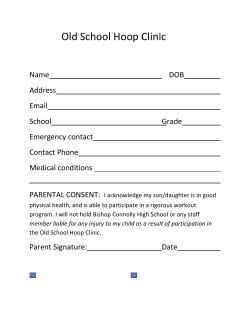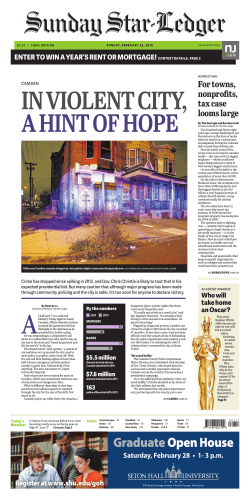
Medical Legal Partnership of Camden
THE DOCKET SPRING 2015 CLINIC AND EXTERNSHIP AT RUTGERS LAW–CAMDEN Medical Legal Partnership of Camden R utgers School of Law–Camden (R-Law), Cooper Medical School at Rowan University (CMSRU), and Camden Coalition of Healthcare Providers (Camden Coalition), three anchor institutions in Camden that already provide hundreds of hours of free or low-cost services to Camden residents, are joining forces to create a Medical Legal Partnership. This effort is being led by two Rutgers–Camden law faculty, Kim Mutcherson, Professor of Law, and Carol Wallinger, Clinical Professor of Law. The relationship between legal problems and health problems has long been clear to those working in law and medicine. For instance, residents of substandard housing with mold or rodents, in violation of sanitary codes, live in an environment that can lead to or exacerbate health conditions like asthma. Senior citizens improperly denied benefits, like access to social services or long-term care, are prevented from getting the healthcare they require. The idea of creating partnerships that integrate legal services into a healthcare setting is one that institutions have begun to aggressively pursue in the past few decades. Despite its relatively short history, the medical legal partnership (MLP) model has proven popular and, more importantly, successful. Dozens of law schools around the country have partnered with local medical services providers to create MLPs that provide free legal services to low-income individuals related to health harming conditions in their lives. The MLP-Camden project is currently in the initial planning phase, gathering the detailed data about patients’ legal needs that the partner institutions require to determine their specific nature and to make well-informed decisions regarding the creation of the MLP. During the 2015–2016 school year, the clinic will enroll students and begin providing free legal services to patients. CONTENT 1 Medical Legal Partnership of Camden 2-3 Rutgers School of Law–Camden Civil Practice Clinic Serving South Jersey for Over 20 Years 4-5 Outside the Courtroom 6-7 Clinic Updates 8 Domestic Violence Program Marks 20th Anniversary RUTGERS SCHOOL OF LAW–CAMDEN CIVIL PRACTICE CLINIC SERVING SOUTH JERSEY FOR OVER 20 YEARS L ast January marked the 20th anniversary of the Rutgers School of Law–Camden Civil Practice Clinic (CPC). Founded in January 1993 as the Rutgers Elderlaw Clinic, the clinic initially focused on providing legal services and community education for Camden’s growing elderly population and provided a clinical legal education for up to 16 students a year. In 1996, the Elderlaw Clinic became the centerpiece of an expanding Rutgers Civil Practice Clinic. Today the Civil Practice Clinic provides legal services and community education to the broader South Jersey community in a wide range of substantive legal areas and provides a clinical experience to nearly 40 students a year. Based in the city of Camden, the CPC aims to not only provide significant learning opportunities for students, but also to be responsive to community needs and cases are selected in order to provide services where the demand is greatest. Frequently, cases are referred to the CPC by legal service organizations, social service agencies, and even by court personnel. The majority of the requests for services are directly from the Camden and South Jersey communities. Over the past 20 years, CPC legal interns have handled hundreds of cases and provided well over 100,000 hours of pro bono legal services to the South Jersey community in a wide variety of areas such as consumer fraud, landlord/tenant, family law, estate planning, breach of contract, Social Security disability, and guardianship. THE DOCKET / SPRING 2015 RUTGERS LAW–CAMDEN 2 Some of the work CPC interns have performed include: CPC interns also continue to represent individuals in Social Security disability matters, and now represent children in addition to adults. Interns have successfully represented and Preparing for trial and successfully Successfully settling a complex settling the case of a senior citizen who was dis- consumer matter with multiple defendants. satisfied by the work of the home improvement In this very litigious case, our clients were contractor she hired to renovate her kitchen. defrauded by a home improvement contractor Not only did the students successfully negotiate after their home was badly damaged by fire asthma, cerebral palsy, as well as to have the contractor redo the renovations to in the middle of winter. The case, which has other disabilities. our client’s satisfaction, the contractor agreed been in the clinic for three years, involved the to pay for the expenses of the expert hired to work of multiple teams of students conduct- Two years ago, the CPC began a part- inspect the contractor’s work. ing discovery, depositions, engaging in motion nership with the Bancroft organiza- Drafting and filing an answer and practice, preparing for trial, negotiating with a very adversarial opposing party, extensively cross-claim on behalf of an elderly client who counseling clients concerning their options and unknowingly co-signed a loan allowing her son drafting numerous settlement agreement. to purchase a motorcycle. At the time the loan obtained benefits for children with attention deficient hyperactivity disorder, behavioral disorders, severe tion in Haddonfield, NJ to represent families seeking guardianship of their young adult, legally incapacitated children -- legal work that often was executed, our client was suffering from a Arguing an appeal in Tax Court on costs families thousands of dollars medication induced dementia. behalf of an elderly Atlantic County resident in attorneys’ fees. Our guardianship who was denied a property tax rebate be- work has since expanded and we Assisting a client in navigating her cause she had not accrued sufficient years of way through the Surrogate Court when her ex- residence in her current home. The client was husband died leaving her executor of his will. relocated to her new home because her previ- Obtaining the dismissal of an ous home was taken through eminent domain. now provide this service to families of disabled individuals throughout South Jersey. eviction proceeding against a mother living More than 20 years after the Civil in public housing with her child. The eviction Practice Clinic began in a small of- proceedings were based on the activities of our fice on the second floor of the law client’s brother. Through a compelling motion to dismiss filed only a week after meeting their client for the first time, students success- school, it continues to grow and offer a rich learning experience for fully advocated with the opposing counsel for law students and high-quality legal dismissal of the action based on procedural services to the Camden and South deficiencies in the complaint. The students then Jersey communities. resolved the issues through informal discussions with opposing counsel in order to achieve a long term resolution to the matter. THE DOCKET / SPRING 2015 RUTGERS LAW–CAMDEN 3 OUTSIDE THE COURTROOM Clinical Professor Ruth Anne Robbins authorizing this type of civil restraining order In a big city criminal courtroom, many cases Perry took the lead role in drafting a plan for This is the philosophy of Advanced Profession- practitioners in areas that are of interest to that has offered her expertise on domestic violence in only the narrow situation of sexual crimes. are prepared and few go forward, witnesses contributions from all major institutions in the alism: Preparation for Practice, a cutting edge student, shadowing practicing attorneys, and are planned but surprises are sure to occur, city—colleges, medical facilities, businesses— seminar designed by Clinical Professor Pam developing the student’s professional network. and errors in law enforcement or inadequate to support a special services district that will Jenoff. The course works with second and third The students support one another, by reporting representation of defendants can jeopardize improve the safety and attractiveness of central year students to identify their goals for after back on field experiences, and working on col- the just outcome of a prosecution. Camden. This semester, Perry has a fellowship graduation and develop a blue print for getting laborative team projects. Each student leaves Angella Middleton ’14 worked in from the Eagleton Institute for Politics on the there and doing well once they’ve arrived. with a developmental plan so that he or she can that system during the fall term of 2014, New Brunswick campus of Rutgers. While still before graduating in December, carefully enrolled in his final term at the law school, he handling many preliminary steps in court as is both continuing to work for Cooper’s Ferry Representing individuals on a child abuse a student lawyer at the Philadelphia District and also working two days each week for the registry is not a goal for many law students, Attorney’s Office. Coming to law school after Woodbridge (NJ) Redevelopment Agency. but some are willing to work to assure fair several years as an administrator at a law firm, treatment for all criminal defendants. Angella is focused on a litigation career. Even law to improve legislation pending in New Jersey. In collaboration with Jessica Miles, a member of the Seton Hall School of Law clinical faculty, Robbins offered comments on pending bills proposed in the wake of the highly publicized Ray Rice domestic violence case, with an eye toward informing the legislature about the hidden potential for the proposed legislation to water-down or hinder existing stringent response measures. In particular, they provided comments on bills designed to create a new permanent civil restraining order system, paralleling domestic violence restraining orders, for plaintiffs who do not have a romantic or familylike relationship with the defendant. In October, Professors Robbins and Miles, and a Rutgers Law Clinic Fellow, Travis Stewart, met with New Jersey Senator Jennifer Beck (11th Legis. Dist./ Monmouth) to discuss the breadth of the pending legislation and the possible overcrowding effects legislation might have on those courts hearing domestic violence matters. Senator Beck has since recommended amendments to the pending legislation, designed to avoid some of those issues. In December, the Senate and Assembly jointly agreed to introduce a new bill, the Sexual Assault Survivor Protection Act PRACTICE EXTERNSHIP: LAW STUDENTS IN ACTION Andrew Munger ’15 spent many hours as a part-time student over the past four years, during the fall term of 2014 working for the she found time for leadership in the law school Mercer County Public Defender, assigned to community, in trial competitions and law jour- a Special Hearing unit where he faced just nal, coaching a high school mock trial team, such cases. Should a 35-year-old man with no and serving as president of the Black offenses since his conviction at age 19 (of an Law Students Association. intimate relationship with a consenting, though underage, girlfriend) have a chance to be re- As the city of Camden struggles to redevelop, an moved from a public sex offender list? Andrew interesting nonprofit works to bring new ideas handled these hearings conscientiously, and to the task. Perry Farhat ’15, who has a de- thoughtfully reflected on the justice issues they gree and prior work experience in city planning, presented in journal comments written for his externed for the Cooper’s Ferry Partnership Practice Externship assignments. A transfer during the fall term 2014. While learning from student, Andrew is currently enrolled in our the varied professionals on the Cooper’s Ferry Child and Family Advocacy clinic. team, located a few blocks from the campus, PROFESSIONALISM EDUCATION AND PRACTICE: SUPPORTING OUR STUDENTS’ TRANSITION “Think of yourself as a lawyer from the day you walk into the law school and you will walk out as well-prepared as any graduate in the country.” continue on the path toward professionalism. “I spent nearly a decade in practice, both at a firm and in-house, and I ran summer programs and did a lot of recruiting,” says Professor Jenoff. “ I realized that through this course I could give my students the ‘playbook’ of everything I wish I had known about both finding a job and succeeding in those critical early years.” The course includes modules and simulations on ethics in action, client relationships, workload management and work-life balance. Each student undertakes significant field work, including informational interviews of multiple Students have found summer jobs and other placements as a result of the contacts they made in this course. The course has received high praise from the students, a number of whom have remarked that the course should be mandatory. CLINIC UPDATES IMMIGRANT JUSTICE CLINIC tion on his behalf. Our client was sworn in as a In addition to representing youth on a variety research memos for this high profile litigation, ordered services. Lastly, the students worked RUTGERS UNIVERSITY SCHOOL citizen over the summer and had his removal of delinquency matters, this past semester CJC which garnered media attention. with Allen’s school to ensure that an updated proceedings terminated in the fall. students represented youth on appeals to the OF LAW–CAMDEN’S CLINICAL Child Study Team evaluation occurred and that appellate division and participated in amicus First offered in 2009, the Hybrid Clinic allows he was assigned a reading specialist to improve his academic performance. PROGRAM is the law school’s own teaching law firm staffed by faculty and The Immigrant Justice Clinic had many suc- In January after a grueling day of travel to and briefs. CJC students also provide New Jersey students to partner with practicing lawyers to cesses this semester, including obtaining lawful testimony at the Newark Asylum Office, the youth with post disposition representation and research, write, and orally present memos on permanent residence for two teenagers who clinic learned that one of our clients was grant- continue to visit clients after they have been complex legal issues arising in real cases. Other CFAC students have also been assisting the ef- were abused, neglected, or abandoned by par- over one hundred cases and student ed asylum. Gangs in El Salvador threatened her placed in juvenile facilities. partners have included the Philadelphia Com- forts to open the First Star Rowan Academy in ents and who had traveled to the United States after her father, a former member of the mili- mission on Human Relations, the City’s antidis- May 2015. This academy will provide education- attorneys provide more than 25,000 hours on their own. Other noteworthy cases include tary, was murdered in prison. 3Ls Xiomara Uran Handling client interviews, hearings, negotiations crimination agency, and the Appeals Unit of the al support and life skills training to 30 youth in the following. and Alexi Velez, gathered evidence from the with the prosecutor, and trials is exhilarating and Philadelphia Law Department. foster care from Cumberland, Gloucester, and community. All of our clinics are designed Salem Counties. The youth will meet monthly to assist lower income individuals who with mentors and advocates, as well as spend otherwise would have difficulty obtaining United States and El Salvador and researched invaluable for a law student about to embark on Clinic students had the satisfaction of seeing and wrote a persuasive brief in support of the her legal career in the “real world.” Clinic is unlike their client naturalized after he had spent three asylum claim. They prepared detailed affidavits any other law school opportunity, and one that years in detention fighting his removal. Our from the client and her mother, and supported should not be passed up. client, a Vietnam era veteran, was convicted of our client emotionally through her testimony — Jackie, Class of 2015 multiple minor criminal offenses for which he before an Asylum Officer. never served any jail time. One such conviction, from the 1980’s, allegedly involved the Students made their acting debuts at a mock sale of $10 of marijuana and was deemed by an hearing training on Cancellation of Removal for Immigration Judge to be an “Aggravated Felony” Lawful Permanent Residents on Nov. 14, which severely limiting our client’s eligibility for relief was co-sponsored by American Friends Service from removal. While in immigration detention Committee, the Camden Center for Law and for three years, our client successfully appealed Social Justice, Human Rights First, and Legal his case to the Court of Appeals for the Third Services of New Jersey. Circuit, pro se. Upon his release from detention, he found his way to the clinic through a referral from the Camden Center for Law and Social Justice. CHILDREN’S JUSTICE CLINIC Third-year students assisted their client in an The Children’s Justice Clinic (CJC) is litigation application for naturalization under a special based clinical experience that allows 3L stu- provision for veterans who served in times dents to quickly assume the role of an attorney of military conflict. The students successfully in order to represent New Jersey children facing argued that, even if the conviction is deemed delinquency changes. Students have the oppor- to be an “aggravated felony,” under the Code of tunity to experience many aspects of criminal Federal Regulations, he was not barred from law when they represent children in Camden’s establishing “good moral character” by an “ag- juvenile court. Within weeks, students have the gravated felony” conviction from the 1980s, and, opportunity to develop a trial strategy, negoti- in addition, U.S. Citizenship and Immigration ate with the prosecutor, file motions and argue Services should favorably exercise its discre- in front of a Family Court Judge. HYBRID CLINIC In January 2015, a federal district court entered summary judgment against claims that a City of Philadelphia lawyer and social worker violated the constitutional rights of a child who was tortured for years by her aunt. Rutgers students contributed to Philadelphia’s defense of this tragic case. The federal court held that the social worker did not violate the substantive due process rights of the child because the social worker did not create the danger of the aunt’s violent conduct. The court held the social worker absolutely immune to the Section 1983 claims. In addition, upon reviewing defendants’ brief, plaintiff conceded that the City attorney was absolutely immune. Students in the hybrid clinical and writing course Public Interest Research and Writing partnered with the Civil Rights Unit of the Philadelphia Law Department to produce CHILD AND FAMILY ADVOCACY CLINIC students. Each year, the clinics handle 4-6 weeks on the Rowan University campus each summer taking classes and being exposed to the college experience. The First Star Foun- of free legal services to the Camden representation. In addition to providing valuable legal services to the Camden The Child and Family Advocacy Clinic (CFAC) dation has opened six of these very successful Community, the Clinical Program chal- represents at-risk children and families from Academies on college campuses nationwide. across southern New Jersey in a variety of fam- lenges students to apply legal theory to CFAC is part of a large coalition also working ily law, education and public benefits matters. to bring a First Star Academy to one or all of the problems of real people and to reflect In many cases, students serve as the “Law Rutgers’ campuses. on the day-to-day challenges of legal Guardian” representing the interests of children practice. Students enrolled in one of the involved with the Division of Child Protection clinics have primary responsibility for the & Permanency ( formerly “DYFS”) due to abuse representation of clients with intensive and neglect. In addition, students work collaboratively with community partners on public policy and systems reform efforts to improve supervision from clinical faculty who are admitted to practice in New Jersey. the lives of children statewide. To learn more about our comprehensive One current case involves “Allen,” who is a 13-year-old boy living with his paternal aunt due to neglect by his mother and father. When clinic offerings, including the Domestic Violence Clinic and its Domestic Violence students from CFAC first met Allen, he was Pro Bono Project partner, Hybrid Clinics living in a foster home and had not yet been (Advanced Legal Writing: Community allowed to visit with his half-sister. The law Based Practice, International Human students tracked down several relatives and successfully argued for Allen to be moved to a paternal aunt’s home. The judge also ordered Rights Advocacy, Public Interest Research and Writing, and Small weekly sibling visits to begin immediately. Business Counseling), and Externships, CFAC has also been working closely with the visit camlaw.rutgers.edu/clinics. mother’s attorney to help facilitate reunification as soon as the mother completes her court- THE DOCKET / SPRING 2015 RUTGERS LAW–CAMDEN 6 THE DOCKET / SPRING 2015 RUTGERS LAW–CAMDEN 7 DOMESTIC VIOLENCE PROGRAM MARKS 20TH ANNIVERSARY Twenty years ago, the law school created the Domestic Violence Pro Bono Project (DV Project), modest means who could not afford an investigation, and trial experience. They can attorney. Over the years, hundreds of law also explore the many aspects of layer-client student volunteers have assisted thousands relationships. As one former student notes, of survivors in Camden County by helping “This course is the exact type of practical them understand the court system and the experience any law school student should legal and practical implications of obtaining have if they anticipate practicing the law. It a restraining order. prepares your for almost every type of The DV Project, which remains popular can happen as a lawyer. It trains you in an effort to enhance access to justice for amongst students and community part- interviewing and counseling skills, pretrial survivors of domestic violence in their efforts ners, led to the creation of the Domestic and trial experience, memo and brief writ- to break free of the cycle of violence. Trained Violence Clinic (DVC) in 2003. The DVC is ing and also teaches you how to expect the law student volunteers began staffing daily a trial advocacy clinic that relies on third unexpected.” Recently, the DVC has begun rotations at the Camden County Superior year law students to represent survivors in handling more unusual matters, including Court. Their purpose was to provide basic final restraining order bench trials before the appeals, motions for reconsideration and information about the legal resources avail- Superior Court. Students gain insight to both cross-jurisdictional child custody cases able to survivors of domestic violence of civil and criminal process, exposure to fact involving domestic violence. situation, procedure and occurrence that
© Copyright 2025









